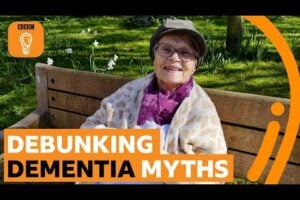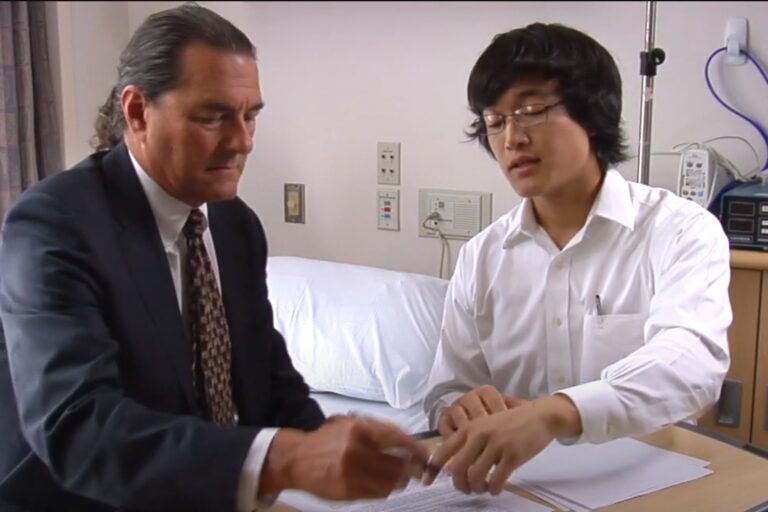Although the progression of Alzheimer’s disease can be slowed down today thanks to today’s medications, it cannot as of yet be stopped. The process is described in general terms as going through 3 steps:
- Mild Alzheimer’s
- Moderate Alzheimer’s
- Severe Alzheimer’s.
For more meaningful terms between professionals, caregivers and patients, a more detailed process has been characterized in seven stages.
The seven stages below are based on a system developed by Barry Reisberg, M.D., clinical director of the New York University School of Medicine’s Silberstein Aging and Dementia Research Center.
Stage 1 – Normal
This system calls a mentally healthy person at any age “Stage 1”.
- No memory problems
- No problems with orientation
- person – your name, who you are;
- place – what country, state, city you live in, where you are;
- time – what day, date, season it is
- No problems with judgment
- No difficulties with communication skills
- No problems with daily activities
Stage 2 – Normal Aged Forgetfulness
Free subscription to Alzheimer’s & Dementia Weekly. Click here.
More than half of all people ages 65 and older complain of cognitive difficulties. This is considered a normal part of aging.
- Occasional lapses in memory, usually undetectable to family and friends
- Slight cognitive problems, also undetectable to friends and family, might also not be visible on medical exam
Stage 3 – Mild Cognitive Impairment
At this point, there are mild changes in memory, communication skills and/or behavior, noticeable to family members and friends. Symptoms might be picked up by an alert physician. Many people will not decline further than this point. Notwithstanding, a majority do progress to Mild Alzheimer’s within two to four years.
- Problems remembering names, words for objects
- Difficulties functioning at work and in social settings
- Problems remembering newly-read material
- Misplacing important items with increasing frequency
- Decline in organizational skills and the ability to plan
- Repeating questions and evident anxiety
Stage 4 – Mild Alzheimer’s
Cognitive symptoms are more obvious now. A neurologist can confidently diagnose Alzheimer’s disease and treat it with medications that have been proven effective in slowing it down.
- Difficulty remembering personal details, recent events
- Some confusion possible (ie: might put towel in fridge)
- Impaired mathematical ability, financial management (trouble managing a checkbook – for those who did not have trouble managing one before)
- Social withdrawal
- Moodiness, depression
Stage 5 – Moderate Alzheimer’s
This is the stage at which it is not possible for a person with Alzheimer’s to live alone.
- Severe memory loss, e.g., may not remember basic personal contact information such as current address or phone number
- Disorientation (not knowing the day/date/season, and/or location/country/state/city)
- No longer safe to cook, even if the sufferer can manage or remember the logistics of the process, due to severe short-term memory difficulties and confusion
- Wandering risk; might get lost once leaving the home
- Decreased personal hygiene skills
- Increased desire to sleep is common
Free subscription to Alzheimer’s & Dementia Weekly. Click here.
Stage 6 – Moderately Severe Alzheimer’s
It is at this stage that family members often suffer the most, because the loved one with Alzheimer’s loses much of the ability to recognize those around him or her, even a spouse, sibling, parent or child. Personality changes are common as well.
- Severe memory loss continues to intensify
- Withdrawal from surroundings
- Wandering
- Reduced awareness of recent events
- Problems recognizing loved ones, although it is still possible to differentiate between those who are familiar and those who are not
- “Sundowning”, if it has not yet begun, makes its appearance at this point – this is the phenomenon of increased restlessness and agitation toward sundown (hence the name), in the late afternoon and evening hours
- Bathroom management becomes difficult; at this stage it often is necessary to switch to diapers due to incontinence, wetting and other such problems using the bathroom independently
- Paranoia, suspiciousness
- Shadowing, extreme anxiety, following a loved one around the house due to fears of being alone
- Repetitive, compulsive behavior (verbal and/or nonverbal)
Stage 7 – Severe Alzheimer’s
This is the final stage of Alzheimer’s disease, at which the long goodbye comes to an end. Even though the Alzheimer’s person may somewhere inside really hear and understand what is being said, he or she can no longer respond, other than possibly to speak a word or phrase.
- Communication is very limited
- Physical systems begin to deteriorate
- Gross motor coordination shuts down, may not be able to sit
- Swallowing may become difficult, choking is a risk
The last stage of Alzheimer’s disease, as with any other illness, is a very individual matter and no two journeys end the same way. People with Alzheimer’s seem to experience little physical pain. What is certain, however, is that every Alzheimer’s journey ends – as does every other. May they all be peaceful and pain free.
A Fresh Perspective

For a new, insight-filled perspective on the stages of Alzheimer’s, check out the video:
Teepa Uses Gems To Illustrate The Stages Of Alzheimer’s
In this video, Teepa Snow shows what to expect, while keeping the focus on the person, not the disease.
Free subscription to Alzheimer’s & Dementia Weekly. Click here.











Mom will be 92 this July. She has terrible ST memory loss but can yell u everything from years ago. She knows her SS number and birthdate. She walks with a cane and in wi ter usesWalker. I watch her for when she needs pain med. She will say she hurts or shows signs of pain but does not ask for med. She is not taking meds like she use to so cut out her supplements so she wouldnt complain of taking so many but still gets important ones. Shes in briefs and pads but takes self to bathroom and I have to check her for inzcontinence at times. She feeds self but was eating 3 squares a day I fix to now maybe doing g one and half. She does hydrate well with ice water which I keep fluids at her side at all times. She was getting up in am and staying up all day then naps in between now she wants to sleep all the time. She is getting weaker a d color more pale. Have a dr appt for her for blood work for lab and a check up.She gets into paranoia and a ger stages and usually last about 1 to 2 weeks then she comes back and throws her arms around me and thanks me and tells me she loves me and to never forget it with years in her eyes. I always look forward to when she comes back to me. . I know it's coming… but I will never be ready. I love her so much. .
Alzimer is a serious disease. Its early diagnosis and treatment is very important. Thanks for sharing a great content about it. Beautifully presented!
My Father has been dignosed with dementia..now he hardly speaks..often just few words..he do able t lo eat but with someone help..any home.remedy etc which helps along with doctor medicine?
My Father has been dignosed with dementia..now he hardly speaks..often just few words..he do able t lo eat but with someone help..any home.remedy etc which helps along with doctor medicine?
Thanks for creating this article. It is a very strong reminder of how much Alzheimer's can affect us all.
I really hope the day come sooner when this disease can be cured.
This is a great reminder that alzheimers has taken so many loved ones. I really wish there was a cure for this horrible disease!
great
I wish I could get my mother into a neurologist it is a 6 month wait list to see the nearest neuro and the next city is 50 miles away. Her GP is doing his best to give her comfort I believe she is entering stage 7 … it’s been a rough year I lost my Dad In January and my husband in March…it seems like her dementia accelerated at a rapid pace. She is healthy as a horse but her mind is gone. The sundowners and hallucinations are the worst. Finally got her on an antipsychotic medicine that helped slow the agitation and hallucinating episodes. I might get some sleep tonight.
you are brave..keep it up!!!wish you best of luck…
My grandmother is between 5-6. She believes there is nothing wrong with her, and if you bring up the fact that she just asked you the same question 8 times in 2 minutes, she becomes hostile and flips out. I've had to switch her aspirin with lactose tablets, because she takes about 20 a day and was poisoning herself with aspirin (at one point, she had bruises all over her body). She also pathologically hides things; including things that aren't even hers. She's called the police on me numerous times for nebulously-described non-existent "abuse" and also for "cutting up her cats" and hiding their bodies in the garbage. Any time she sees me take the trash out, she will sneak outside to go through it, expecting to find her cats from 20 years ago. Oh yeah, and recently she spontaneously tried to give away her elderly cat, who sleeps at the foot of her bed every night. When questioned, she was unable to articulate any sort of answer. Lately, she likes to ring my phone 30 times a day (especially in the middle of the night) because she perpetually believes she is having a heart attack (hence the aspirin consumption). This is despite her being in remarkably excellent health, aside from her brain.
Thankfully, she can still use the bathroom unaided. However, she has no capacity for memory whatsoever. That is to say, she will immediately forget what just happened minutes ago 100% of the time.
my mummy is at stage 6. so cruel this awful disease